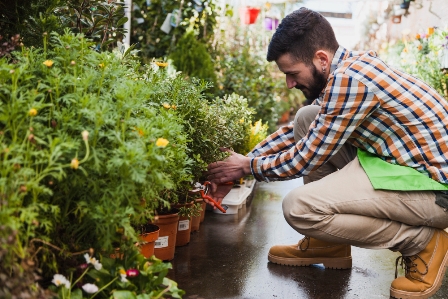In recent years, there has been a significant shift in gardening practices as more individuals and communities embrace sustainable and environmentally friendly approaches. One such approach gaining popularity is organic gardening. This article explores the principles and benefits of organic gardening, guiding you through the essential aspects of this natural and eco-friendly method.
What is organic gardening?
Organic gardening is a holistic approach to cultivating plants that focuses on maintaining soil health, biodiversity, and avoiding the use of synthetic chemicals. It’s a method that works in harmony with nature, recognizing the interconnectedness of all living organisms in the garden ecosystem.
The shift towards sustainable practices
As environmental awareness grows, there is a noticeable shift towards sustainable gardening practices. Organic gardening aligns with this trend, offering a viable solution to create thriving gardens while minimizing environmental impact.
Understanding Organic Gardening
Definition and principles
At its core, organic gardening revolves around principles that prioritize soil health, biological diversity, and the avoidance of synthetic pesticides and fertilizers. It is an approach that recognizes the importance of working with nature rather than against it.
Importance of avoiding synthetic chemicals
Synthetic chemicals, commonly used in conventional gardening, can have detrimental effects on both the environment and human health. Organic gardening emphasizes the use of natural alternatives, fostering a more sustainable and eco-friendly garden.
Focus on soil health
Central to organic gardening is the emphasis on building and maintaining healthy soil. This involves practices such as composting, cover cropping, and avoiding chemical soil amendments. Healthy soil is the foundation for robust plant growth and overall garden vitality.
Benefits of Organic Gardening
Healthier produce
One of the primary benefits of organic gardening is the production of healthier and more nutrient-dense produce. Without the use of synthetic chemicals, fruits and vegetables grown organically are free from harmful residues, promoting better health for those who consume them.
Environmental sustainability
Organic gardening promotes environmental sustainability by reducing the reliance on synthetic pesticides and fertilizers that can harm ecosystems. The use of natural and organic methods contributes to the conservation of biodiversity and overall ecosystem health.
Economic considerations
While there might be initial adjustments in transitioning to organic gardening practices, the long-term economic benefits are significant. Reduced reliance on costly synthetic inputs and improved soil health can lead to sustained and cost-effective garden management.
Getting Started with Organic Gardening
Soil preparation and composting
The first step in organic gardening is soil preparation. Building nutrient-rich soil through composting and using organic matter sets the stage for successful plant growth. Composting kitchen waste and yard debris creates a natural fertilizer that enhances soil structure and fertility.
Selecting organic seeds and plants
Choosing organic seeds and plants ensures that your garden starts with a clean slate. Organic seeds are free from genetic modification and have not been treated with synthetic chemicals, providing a foundation for a truly organic garden.
Pest control without harmful chemicals
Organic gardening employs natural pest control methods to manage insect populations. Introducing beneficial insects, practicing companion planting, and using organic pesticides derived from natural sources help maintain a balance without harming the environment.
Companion Planting in Organic Gardens
Enhancing biodiversity
Companion planting is a technique where specific plants are grown together to maximize the benefits of their interactions. This practice enhances biodiversity in the garden, creating a more resilient and balanced ecosystem.
Natural pest control through companion planting
Certain plants emit natural compounds that repel pests or attract beneficial insects. Utilizing companion planting strategies helps control pests without the need for harmful chemical interventions, contributing to the overall health of the garden.
Water Conservation in Organic Gardening
Importance of water in organic gardens
Water is a precious resource, and organic gardening emphasizes its efficient use. Understanding the water needs of plants, utilizing mulching techniques, and investing in water-saving irrigation systems are key aspects of water conservation in organic gardens.
Water-saving techniques
Implementing water-saving techniques such as drip irrigation, rainwater harvesting, and proper soil moisture management minimizes water wastage. These practices not only benefit the environment but also contribute to the sustainability of the garden.
Crop Rotation and Organic Gardening
Preventing soil-borne diseases
Crop rotation is a fundamental practice in organic gardening that helps prevent the buildup of soil-borne diseases. By changing the location of crops each season, the risk of diseases that affect specific plant families is significantly reduced.
Improving soil fertility through crop rotation
Beyond disease prevention, crop rotation enhances soil fertility. Different plant families have varying nutrient needs, and rotating crops helps maintain a balanced nutrient profile in the soil, promoting healthier plant growth.
Maintaining a Balanced Ecosystem
Encouraging beneficial insects
Organic gardening relies on the support of beneficial insects for natural pest control. Planting flowers that attract pollinators and creating habitats for beneficial insects contribute to a balanced and thriving garden ecosystem.
The role of pollinators in organic gardens
Pollinators, such as bees and butterflies, play a crucial role in the pollination of flowers and the production of fruits and seeds. Creating a garden environment that attracts and supports pollinators is essential for the success of organic gardening.
Common Challenges in Organic Gardening
Dealing with pests and diseases organically
While organic gardening minimizes the use of harmful chemicals, it doesn’t eliminate the challenges of pests and diseases. This section explores effective organic methods for managing common garden issues, ensuring a healthy and thriving garden.
Weather-related challenges
Weather fluctuations and extremes can pose challenges to organic gardening. Strategies for adapting to unpredictable weather patterns and protecting the garden from adverse conditions are discussed, allowing gardeners to navigate weather-related challenges successfully.
The Future of Organic Gardening
Increasing awareness and adoption
The future of organic gardening looks promising as awareness of its benefits continues to grow. This section explores the increasing adoption of organic practices and the positive impact it can have on global food production and environmental conservation.
The role of technology in sustainable agriculture
Innovations in technology are playing a crucial role in advancing sustainable agriculture, including organic gardening. From smart irrigation systems to digital tools for monitoring soil health, technology is enhancing the efficiency and productivity of organic farming practices.
Tips for Achieving Organic Gardening Success
Patience and commitment
Success in organic gardening requires patience and commitment. Building a thriving organic garden is a gradual process that involves learning from experiences, adapting to challenges, and staying dedicated to sustainable practices.
Continuous learning and adaptation
The world of gardening is ever-evolving, and staying informed about new organic gardening techniques, tools, and research is essential. Embracing a mindset of continuous learning and adaptation ensures that your organic garden remains vibrant and successful.
FAQs
Organic gardening can be adapted to various skill levels, and there are plenty of resources available to guide beginners.
Companion planting, introducing beneficial insects, and using natural pest control methods are effective ways to manage pests organically.
Organic gardening can be adapted to various spaces, from small urban gardens to larger rural areas. It’s about maximizing the potential of the space you have.
Over time, organic gardening can lead to cost savings by reducing the need for synthetic inputs and promoting overall garden health.
Technology can enhance organic gardening practices, from efficient irrigation systems to digital tools for monitoring soil health and plant conditions.
Conclusion
Organic gardening is more than a gardening method; it’s a philosophy that prioritizes harmony with nature, sustainability, and the production of healthy, nutrient-dense food. By understanding the principles and benefits of organic gardening and implementing practical strategies, individuals and communities can contribute to a more sustainable and environmentally conscious future.


